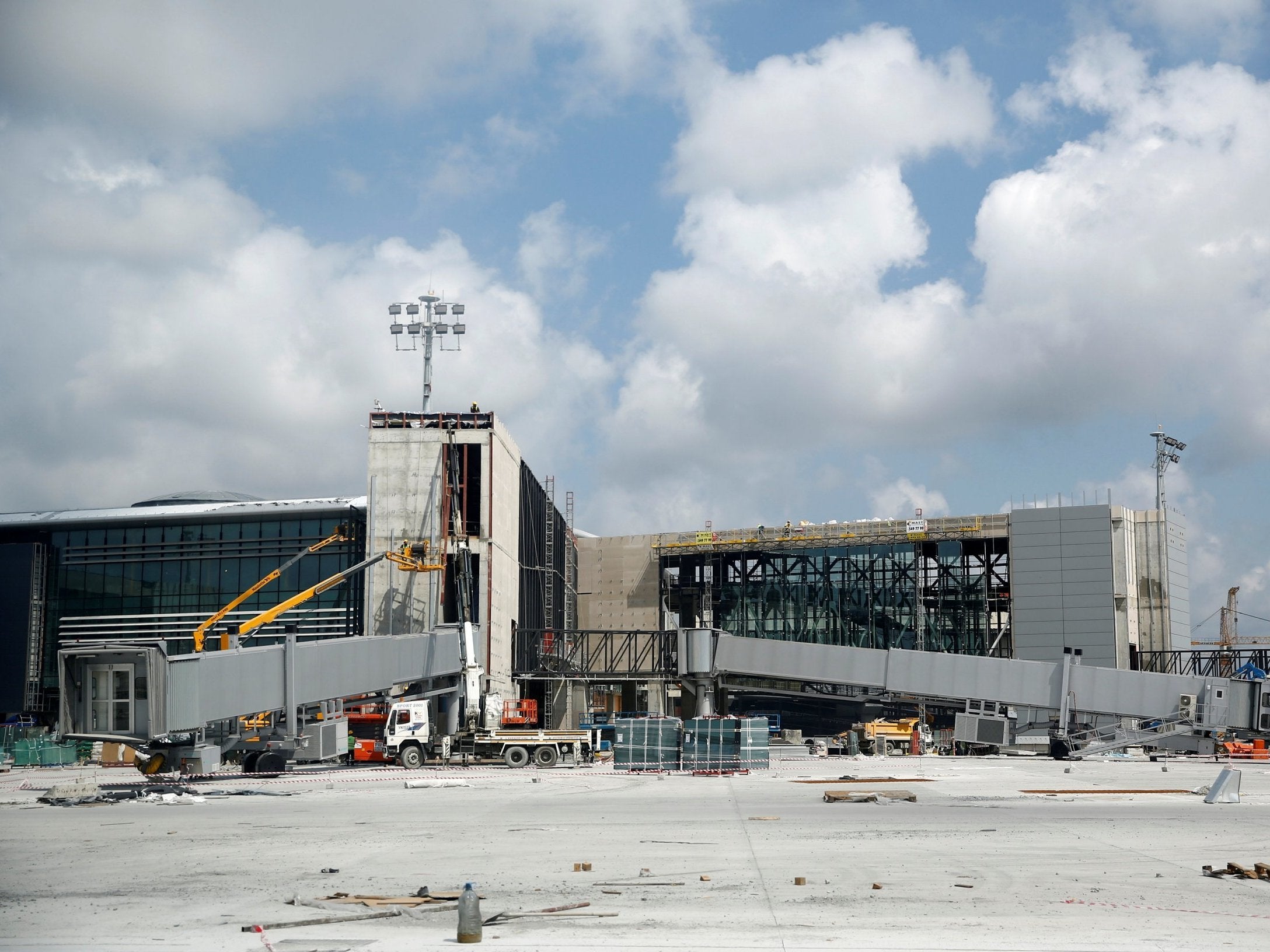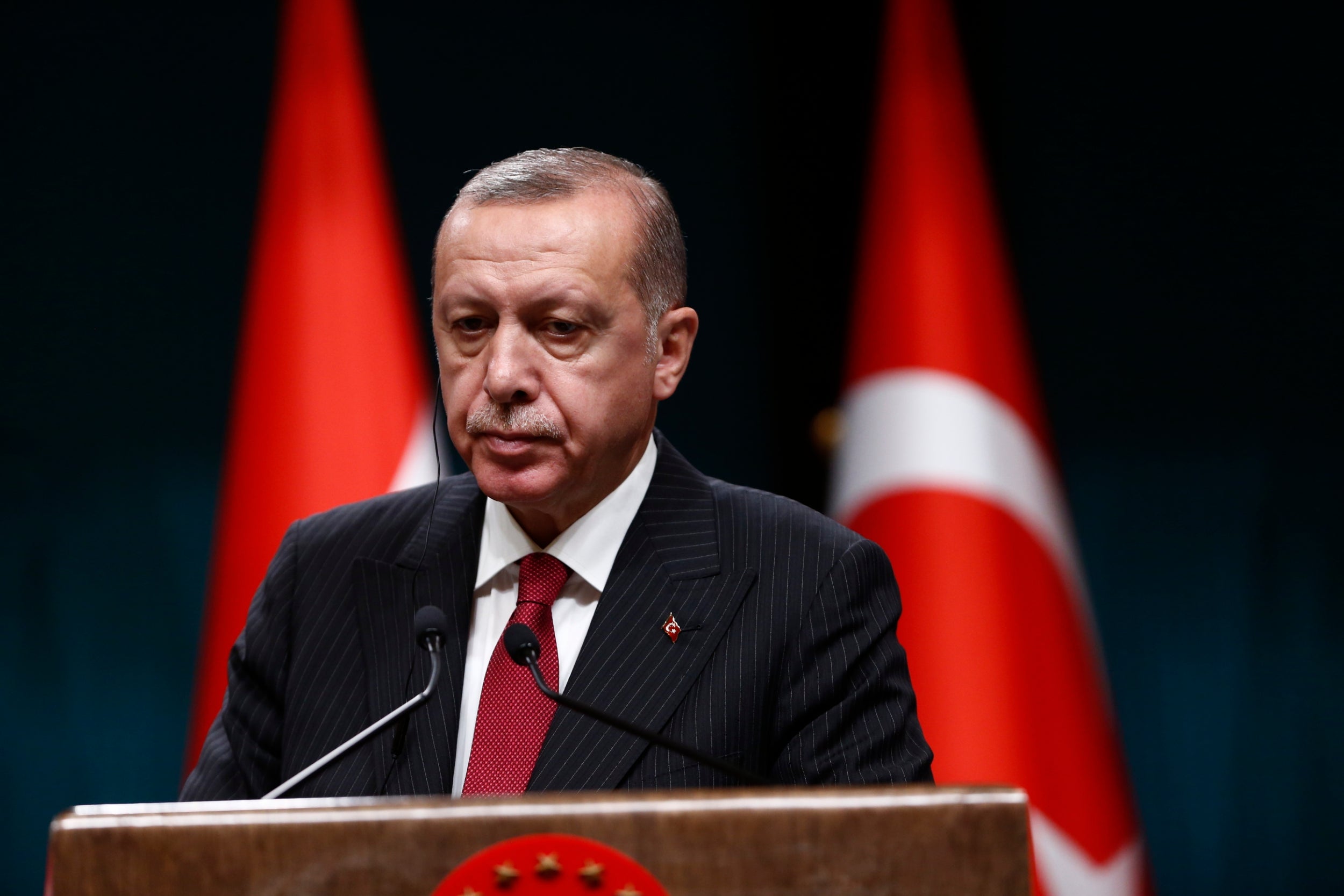Erdogan's legacy construction projects stall amid Turkish financial crisis
Ambitious building projects, which created jobs and controversy, appear to be on hold, as lira loses 40 per cent of its value
Your support helps us to tell the story
From reproductive rights to climate change to Big Tech, The Independent is on the ground when the story is developing. Whether it's investigating the financials of Elon Musk's pro-Trump PAC or producing our latest documentary, 'The A Word', which shines a light on the American women fighting for reproductive rights, we know how important it is to parse out the facts from the messaging.
At such a critical moment in US history, we need reporters on the ground. Your donation allows us to keep sending journalists to speak to both sides of the story.
The Independent is trusted by Americans across the entire political spectrum. And unlike many other quality news outlets, we choose not to lock Americans out of our reporting and analysis with paywalls. We believe quality journalism should be available to everyone, paid for by those who can afford it.
Your support makes all the difference.Turkey’s financial meltdown has brought the country’s years-long construction boom screeching to a halt, with even some of President Recep Tayyip Erdogan’s favourite projects being suspended or scaled back amid a cash crunch and debt woes.
In recent weeks, worried murmurs about stalled projects among developers and ordinary Turks about dormant construction sites and half-finished buildings left untouched for months have reached a crescendo.
This week local news outlets reported that a key transport project in Istanbul, the Kabatas ferry terminal connecting the city’s European and Asian sides of Turkey’s commercial capital, would be scaled back.
Across the country, experts say construction sites have gone dormant, projects suspended or delayed. The construction cranes remain in place, but the work has stopped.
“The huge companies that do fancy infrastructure projects – they don’t have any money,” said one developer who is well-connected to official circles.
“The government has a spending freeze. They’re going to reconsider all the projects and reprioritise.”
Mr Erdogan, a former mayor of Istanbul, built his reputation and electoral popularity on undertaking gigantic public works projects like mosques, airports, and bridges, as well as facilitating big private sector projects that included showy housing complexes, glittery office towers, and shopping malls packed with Turkish and international retail brands.
But the miracle was built on cheap credit from abroad, which has now dried up in a climate of rising US interest rates and doubts about Turkey’s economic health. And financial experts, developers, and bankers say many of Turkey’s projects – including the 45km Istanbul canal connecting the Black Sea to the Sea of Marmara that even Mr Erdogan himself called “crazy” – are now in doubt.
“The Istanbul Canal is almost impossible,” said Atilla Yesilada, an economist and consultant. “Because no one wants to lend to Turkey now.”
The government has a spending freeze. They’re going to reconsider all the projects and re-prioritise
Just a few months ago, Istanbul’s Taksim Square was a cacophony of construction noise. The square itself had been recently resurfaced and redesigned. The red early 20th century era tramway line that edges along adjacent Istiklal Street had been upgraded the previous year with new tracks.
The old Ataturk Cultural Centre was being torn down to make way for a gleaming new opera and performance centre. A gigantic Ottoman-style mosque was rising adjacent to the square, with cranes putting in place pieces of the dome and minarets.
But much of that building has stopped in recent weeks.
Insiders say Turkey’s financial crunch has frozen many projects, though urban planning experts complain that information is scant and neither municipal nor national officials have been forthcoming about which projects have been cancelled, delayed, revised, and which remain on track.
The Independent spent hours calling and emailing officials, contractors, and architects associated with projects but obtained little hard information. The first phase of Istanbul’s New Airport, described as the world’s largest, remains on schedule and is still set to open on 29 October, the 95th anniversary of the founding of the Turkish Republic.

But two urban planners said six of eight Istanbul subway line projects have been delayed.
“Even if it’s not officially admitted, all of these projects are slowing down or being deferred,” said Mr Yesilada.
Even before Turkey’s most recent troubles that began a month ago, the economy was slowing. Private sector building permits were down 40 per cent in the first half of 2018 compared to the previous year, according to numbers published by Turkstat.
Developers found themselves in a bind because they often borrowed easy money from banks to finance construction and then used the cash to purchase more land instead of building up projects. “Now the developers have a lot of land and no liquidity to finish their projects,” said one developer
Turkey’s finance minister, Berat Albayrak, last month announced that all ministries would reexamine investment projects as part of belt-tightening measures brought on by the fall of the lira. The currency has lost 40 per cent of its value this year, a collapse brought on by tensions with the US and long-simmering worries about Turkey’s creditworthiness.
In the public sector, even projects like the rebuilding of the National Intelligence Headquarters in Ankara have been put on hold. Mr Yesilada said developers working on public contracts have begun telling workers to stay home, complaining that they’re not being paid for government projects. “They are told to wait until the treasury has money to receive compensation,” he said.
Even if it’s not officially admitted, all of these projects are slowing down or being deferred
Private sector projects have stopped contractors they don’t want to buy raw materials or take on employees until they’re sure they’ve signed on buyers.
Housing projects that include luxury Istanbul condos have begun excavation but have stopped building. Home sales, buoyed by the cheap lira, remain constant. But many subdivisions that sprouted up are without buyers. Realtors estimate between 1.4 million and 2 million units without buyers.
“In terms of private construction we’re talking about a smaller version of China’s shadow cities – subdivisions that have been developed but there are no buyers for them,” said Mr Yesilada. “We have an unsold stock of units totalling anything from two to four years. A lot of builders are going to exit the industry.”
Such major boom-bust hiccups are not uncommon in rapidly developing countries. The Persian Gulf city-state of Dubai suffered a similar fate following the 2008 global financial meltdown, recovered, and even expanded again. But Dubai was rescued with a $20bn (£15bn) bailout by its richer big brother, Abu Dhabi, capital of the United Arab Emirates. Turkey has no such benefactor, though gas-rich Qatar has vowed to pump $15bn in investments into the economy.
During past economic crises, government entities such as Turkey’s housing authority, TOKI, or the state-owned Halkbank have rescued distressed companies and projects. But this time, Turkey’s government is also cash strapped, and Halkbank may face a massive fine in a US court case over its dealings with Iran. Some insiders say scaling down, delaying and cancelling projects might be the wisest course.
“There’s no liquidity; Erdogan has a vision of where we’re going,” said the developer. “But forcing everyone to continue building by printing money is not the smart thing to do. This is a good time for the government to take a step back and take stock of everything.”
Turkey’s years-long construction boom transformed the the skylines of Istanbul and other cities, created thousands of jobs, and generated enormous wealth. But the projects also sparked significant pushback and criticism over their impact on the environment and their scale.
Until two years ago, the Kabatas ferry terminal on Istanbul’s European side was a dowdy and slightly rundown but perfectly functional, beloved and busy transit point. Then came an ambitious plan to transform the port into a sleek glass-and-steel terminal shaped like a seagull, sink the adjacent highway underground, where 1,000 parking spaces and 83,00 square metres of shops and galleries would be built.
Conservationists and planners complained that the so called Kabatas “Seagull” project was unnecessary, too big and would permanently transform the city’s coastline. But the project went ahead. The terminal was shut down, and the boats diverted to other ferry landings to the south and north of the Bosphorus.

Work commenced in the summer of 2016. For months, contractors drilled pillars into the floor of the strait, to hold up massive concrete piers. An even more ambitious plan by Istanbul’s previous mayor to build a pedestrian tunnel underneath the surface of the Bosphorus was scrapped last year.
Then as Turkey’s financial difficulties ramped up this summer, work slowed, and then came to a halt. This week, in response to reports that the project was being abandoned, the Istanbul mayor’s office countered that the project was merely being revised to exclude the underground component. Many were aghast.
“They filled in the Bosphorus and damaged the structure of the coast,” said Ersin Kiris, president of Politeknik, an association of progressive Turkish architects and engineers which first publicised the news about Kabatas. “The harm has already been done.”
Kanat Atakya, a columnist for the daily Hurriyet, mocked the entire episode, and the lack of transparency about a project undertaken with taxpayer money.
“We did not know the cost,” he wrote.
“We did not know why it was made, so we do not know why some parts will not be made. We do not know exactly when it will be completed. We do not know what kind of ‘facilities’ will be built on that huge concrete lake. Will it be green? Will there just be a sprinkling of plants? When will the ferry service begin? No answer!”

Join our commenting forum
Join thought-provoking conversations, follow other Independent readers and see their replies
Comments